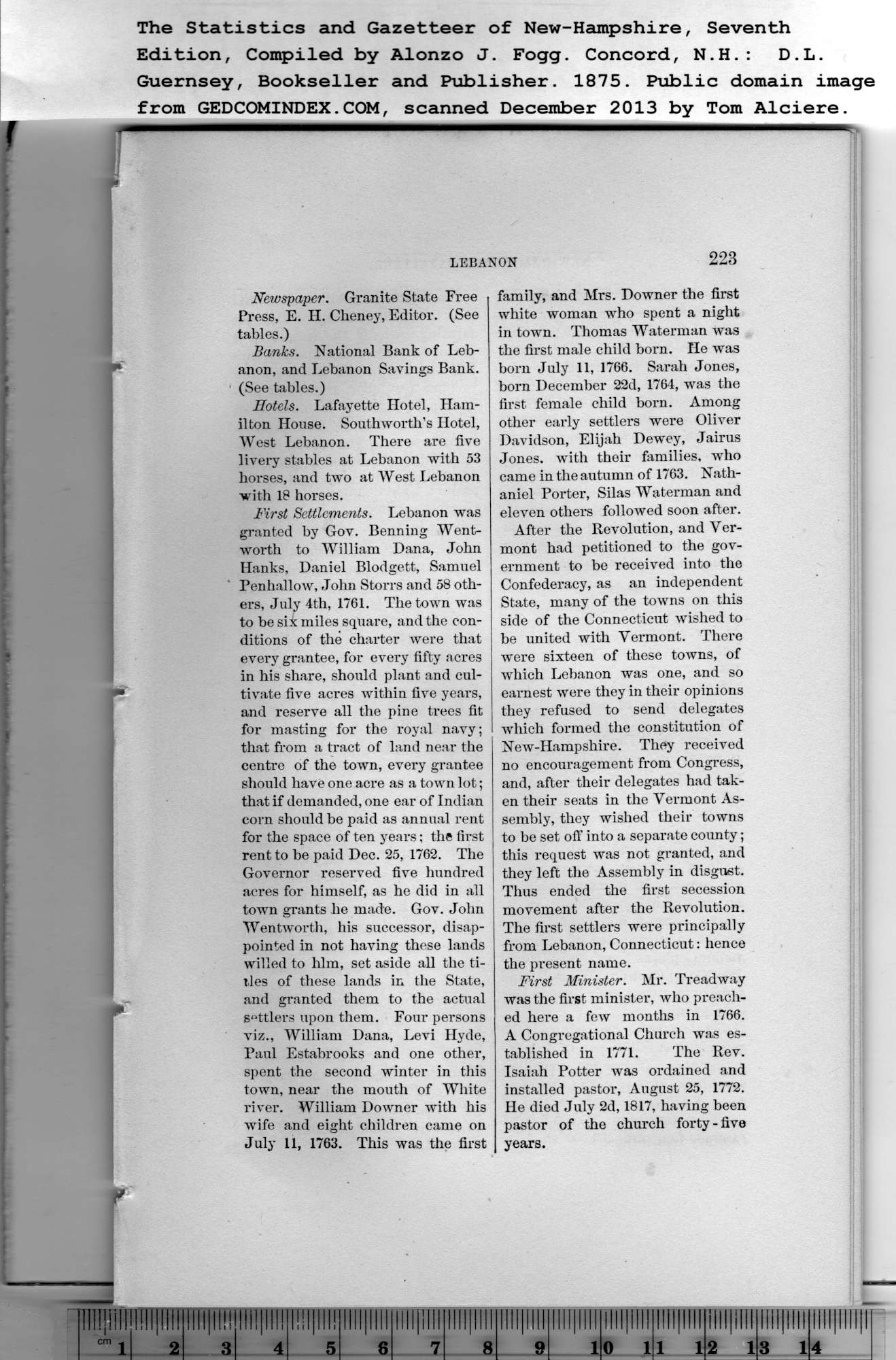|
Newspaper. Granite State Free
Press, E. H. Cheney, Editor. (See
tables.)
The Statistics and Gazetteer of New-Hampshire, Seventh
Edition, Compiled by Alonzo J. Fogg. Concord, N.H.: D.L.
Banks. National Bank of Leb-
anon, and Lebanon Savings Bank.
(See tables.)
Hotels. Lafayette Hotel, Ham-
ilton House. Southworth’s Hotel,
West Lebanon. There are five
livery stables at Lebanon with 53
horses, and two at West Lebanon
with 18 horses.
First Settlements. Lebanon was
granted by Gov. Benning Went-
worth to William Dana, John
Hanks, Daniel Blodgett, Samuel
Penhallow, John Storrs and 58 oth-
ers, July 4tli, 1761. The town was
to be six miles square, and the con-
ditions of the charter were that
every grantee, for every fifty acres
in his share, should plant and cul-
tivate five acres within five years,
and x’eserve all the pine trees fit
for masting for the royal navy;
that from a tract of land near the
centre of the town, every grantee
should have one acre as a town lot;
that if demanded, one ear of Indian
corn should be paid as annual rent
for the space of ten years; the first
rent to he paid Dec. 25, 1762. The
Governor reserved five hundred
acres for himself, as he did in all
town grants he made. Gov. John
Wentworth, his successor, disap-
pointed in not having these lands
willed to him, set aside all the ti-
tles of these lands in the State,
and granted them to the actual
settlers upon them. Four persons
viz., William Dana, Levi Hyde,
Paul Estabrooks and one other,
spent the second winter in this
town, near the mouth of White
river. William Downer with his
wife and eight children came on
July 11, 1763. This was the first |
223
family, and Mrs. Downer the first
white woman who spent a night
in town. Thomas Waterman was
the first male child horn. He was
born July 11, 1766. Sarah Jones,
born December 22d, 1764, was the
first female child born. Among
other early settlers were Oliver
Davidson, Elijah Dewey, Jairus
Jones, with their families, who
came in the autumn of 1763. Nath-
aniel Porter, Silas Waterman and
eleven others followed soon after.
After the Revolution, and Ver-
mont had petitioned to the gov-
ernment to be received into the
Confederacy, as an independent
State, many of the towns on this
side of the Connecticut wished to
be united with Vermont. There
were sixteen of these towns, of
which Lebanon was one, and so
earnest were they in their opinions
they refused to send delegates
which formed the constitution of
New-PIampshire. They received
no encouragement from Congress,
and, after their delegates had tak-
en their seats in the Vermont As-
sembly, they wished their towns
to be set off into a separate county;
this request was not granted, and
they left the Assembly in disgust.
Thus ended the first secession
movement after the Revolution.
The first settlers were principally
from Lebanon, Connecticut: hence
the present name.
First Minister. Mr. Treadway
was the first minister, who preach-
ed here a few months in 1766.
A Congregational Church was es-
tablished in 1771. The Rev.
Isaiah Potter was ordained and
installed pastor, August 25, 1772.
He died July 2d, 1817, having been
pastor of the church forty - five
years. |
